Life s a Corporal Radar Technician - 1960-61
by Corporal Bill Marshall.
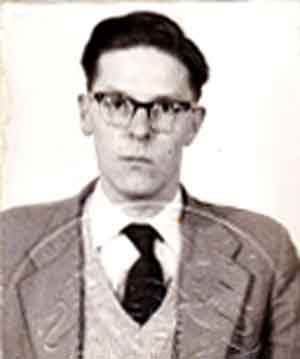

National Service basic training at Bridgenorth was under the direction of Sgt Hodgson and his merry corporal assistants. During this time we were informed of the upcoming visit on the 5th May 1959 of the Shah of Persia and that we might be selected to line part of the route taken by the Royal family and their guests. This required us to perform rather more drill than usual and included the ability to smartly 'change arms' (left/right arm rifle position) whilst on the march to and from the actual route. For whatever reason, we were never required - but we did look good.

After basic training, I was posted to No. 2 radio school at Yatesbury where I decided to sign on for 3 years. Then to RAF Boscombe Down as an air radar fitter working on the airborne radar system known as
AI 17 which I had been involved with when employed as a trainee engineer at E K Cole Ltd. This company had moved from Southend-on-Sea in Essex, to Malmesbury in deepest Wiltshire at the outbreak of WW2 to work on developing airborne radar, and other military equipment. Recently married, we lived in Salisbury with my wife working at the nearby Chemical and Biological research establishment at Porton Down. My wife reports that before being employed she had to pass an intensive medical examination. The reason being that many former personnel were claiming to be suffering from medical conditions picked up from the establishment. At that time I was, thanks to the RAF, undertaking a part time course in electronic engineering at Southampton University. One evening a week I taught radio theory at the local Technical College.

Our well-ordered lifestyle was suddenly upset when I was posted to the 2nd
TAF in Germany. I spent few days at Wildenrath being briefed and then sent by train to Jever. This of course was at the time of heightened tension between the West and East. Since my specialisation was
AI 17, it was almost inevitable that I would be posted to an establishment having no such equipment! The
Hunter aircraft at the station only had a simple fixed beam radar ranging function. However I was also responsible for the first and second line servicing of the
IFF and navigation systems. On one occasion, I found a fault with one of the
IFF antenna which necessitated the removal of the aircraft engine to replace a short length of co-axial cable - I was not very popular with the engine mechanics that day.

On arrival at Jever I was rather surprised to meet up with Sgt Hodgson who had now been transformed into a rather pleasant character, undertaking rather less strenuous admin duties. Although the pay was very poor (tied apparently to local rates) my wife undertook clerical and correspondence duties for Sqn Ldr Watkins and
Wg Cdr Bolt.

One very memorable event was when one of the junior technical staff attempted to disconnect a large 28 volt bank of lead acid batteries that were on constant trickle charge from the mains supply. Using a double ended metal spanner he started to release one of the very stiff battery terminals. Suddenly the spanner gave way and immediately rotated onto the other terminal where it instantly short circuited the whole bank and welded the two terminals together. Within seconds the spanner became too hot to handle; the cells began to heat and then boil quickly filling the room with acidic fumes and the rapid evacuation of all present. Having second line servicing facilities, there were many pieces of electronic test equipment all of which became contaminated with the acidic fumes. All this equipment had to be returned to the UK for de-contamination no doubt at considerable expense. I never found out how the damage was explained to the powers that be.

By advertising in the local newspaper, I found a nice flat in Antonreligstrasse owned by Frau Tralls who spoke a little English and lived with her elderly mother Frau Geis, and son Helmut who spent most of his time away fishing in the North Sea; he made it obvious that he disliked the Brits but still sometimes supplied us with fresh fish. This was the first time we had ever lived in a house with central heating which we much appreciated the first winter.
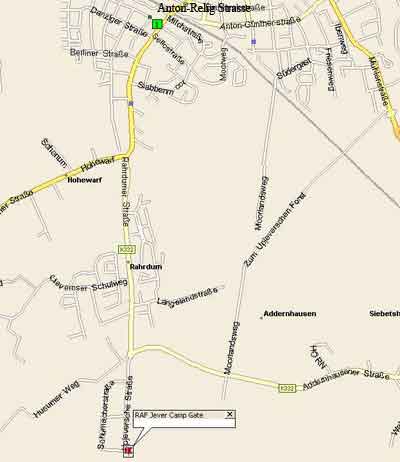
Location of Bill's flat to RAF Jever Main Gate.

At times my wife used to teach English to some of the local children but was surprised one day to be told by one that her accent was not of Oxford! Frau Tralls noted that we liked our butter but could not believe that it had come all the way from New Zealand. Although we were advised not to drink the local milk, out of courtesy we accepted it graciously in tea and coffee when offered by our German hosts. Everybody's refuse such as tins, paper, bottles etc. was regularly collected and recycled.

I made an overnight rail journey to Krefeld where I purchased a Triumph Herald and drove it back to Jever the next day.
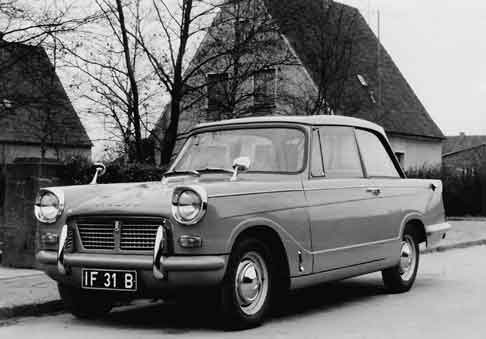

Like other armed forces private vehicles it was given a special armed forces number plate mine being IF-31-B. I believe that some years later due to increasing unrest about our continued military occupying presence, all such vehicles were allocated German style plates, although the often
RHS steering wheel would have been an immediate giveaway to our likely nationality.

One very notable event occurred just before my wife joined me at Jever. With a friend I attended an evening playing bingo and to my complete surprise won the top game getting £50 - a considerable amount at that time (At Nov2013 prices=£1,028.) when the average weekly wage was less than £10 (At Nov2013 prices=£206). Sometime later we joined a group travelling to Amsterdam for a long weekend - very enjoyable. One of our longer holidays was spent visiting Denmark which we also liked very much. The ferries to the main islands served very interesting open sandwiches - a new experience. Apart from Odense (of H.C Anderson fame) and Copenhagen, we visited Helsingør to see Elsinore castle the setting for 'Hamlet Prince of Denmark'. Unfortunately it was closed for visitors at that time, so off we went to Helsingborg in Sweden byway of another short ferry crossing. There we were startled but impressed by the very modern and un-inhibited stone figures arranged along the footpaths.

During the exam season, the station education staff kindly invigilated whilst I undertook a 3 hour examination in electronics based upon my course at Southampton University. This I passed allowing me to become a graduate member of the
IERE (Institution of Electronics and Radio Engineers) later to be incorporated into the
IEE (Institute of Electrical and Electronic Engineers) which itself in turn became the current
IET (Institution of Engineering and Technology). I eventually become a full member of the institution and later a chartered engineer.

At some grand
AOC inspection parade, we were expected to perform an elaborate formal salute. This involved the entire parade on a single command, to slope arms and then march exactly twelve steps, halt, and then all together, present arms to the
AOC. It was nothing short of a miracle that everyone, even the officers, managed to count the required number of steps exactly and carry out the presentation together without a single mishap. A very risky decision by the
station commanding officer who must have had his fingered crossed - but this time it worked! I have never seen this potentially disastrous manoeuvre ever repeated.

After an enjoyable period at Jever, I posted to 11 Squadron at Geilenkirchen which had
Gloster Javelin aircraft having
AI 17 radar systems - at last! However, en-route to my new posting my Triumph Herald came to a sudden halt with a broken half shaft (for the second time). We were unceremoniously towed to a small German country garage where in a few hours they undertook a repair by welding the two halves back together. With an advised speed limit of 30mhp we trundled off to Geilenkirchen. I do not believe that any small UK garage would have attempted such a difficult repair - incredible!

Once again I had to search for and find a flat which I managed to do fairly easily. We actually replaced an American service couple who were moving on. Here we were quite close to the Dutch border and visited Heerlen frequently for shopping particularly for foods not available in the
NAAFI. This is where we came to find and enjoy Nasi Goreng a spicy dish that the Dutch had inherited from their East Indies. Work involved shifts either 08:00 to 17:00 or 17:00 to end of flying which would usually about 23:30, sometimes earlier but rarely later. Most aircraft problems/faults would be resolved before leaving. This was first line only servicing meaning the replacement of dud units with working ones. At this time there was a very high level of tension between the West and East and occasionally a small number of aircraft were ready for rapid take-off with both the pilot and navigator being strapped into their seats. During my time one aircraft on landing crashed just short of the runway killing both occupants - very sad.

For one month in 1961, the squadron moved to Sylt just a short distance from Jever which I believe had by then been handed over to the German Air Force. The main objective of the Sylt exercise was to practise searching for, tracking, and finally firing live ammunition at targets fitted with radar reflectors. These targets were reportedly, towed by aircraft piloted by Germans (if true, quite appropriate we thought). If any aircrew had ever managed to hit the target I am fairly certain it would have been celebrated in some manner, but we never did! Apparently there was a nudist only section on a nearby beach but it did not appear to be frequented while we were there.

Back in Geilenkirchen, we enjoyed a couple of holidays at this time, one to the Hartz Mountains and the other to Austria in particular Zell am See, both very enjoyable. My wife had a girl friend to stay with us for a week, arriving and leaving by train from Aachen. All went well until her return trip. Leaving my car at a meter just outside the station, all three of us waited at the appropriate platform for the
TEE (Trans European Express) train. Dead on time the train arrived and I helped our visitor onto the train finding the reserved seating. As I began to leave I noted that the train was slowly moving off and made my way to the nearest exit. Unfortunately someone was blocking the inward opening door and the train was accelerating. The train had stopped for less than one minute. Such trains tend to travel non-stop from city to city so I could see myself trapped on board without much money a ticket or passport until we reached Brussels. Of course my wife was left trying to explain her situation to puzzled station staff. Fortunately for me the train had to stop at the Dutch border only a short distance down the line. There I left the train and returned back to Aachen within half an hour or so. Meanwhile my wife had been told what would happen but was still very relieved to see me on my return.

During our three years, entertainment included many visits to the Astra cinema and the occasional dance in the corporal's mess. The good German radio in our flat was used to listen on to all the English speaking programs including the British and American stations. During this time much of the music of Elvis was being played in particular 'Wooden Heart' which still brings back memories each time we hear it. We also had portable record player that could play seven and twelve inch records - some of which we still have.

In early 1962, my three year military service completed, we returned to the UK where I was recruited by the
RNSS (Royal Navy Scientific Service) to work for the Government on communications systems. This turned out to be in the Foreign office but was actually
GCHQ in Cheltenham. At that time the very existence and work of
GCHQ was unknown to the public. For a few years, I was placed on a paid special RAF reserve to return to active service at short notice. I worked at
GCHQ until 1999 when I retired. Although little may be said of my time there, I did during the cold war period visit Berlin many times by air. However, on one occasion I and a colleague drove out from the UK for a month's duty at RAF Gatow and Teufelsberg (see Wikipedia and other articles). This meant having to use the main road corridor from Helmstedt on the West/East German border to Berlin with an army escort.

The RAF therefore gave me many first time experiences including:-
Flying

At age 15 whilst in the school
ATC. From RAF South Cerney in an open cockpit double wing propeller driven aircraft - unforgettable!
Gunnery

As above using both 0.22 and 0.303 calibre rifles
Navigation

As above taught basic fundamentals by retired RAF officers
National service

Served at a time of high international tension using my specialist technical training.
Full time service

Signed on for 3 years' service whilst at Yatesbury as a J/T, UT J/T.
Troop ship

Once in a lifetime experience; never to be repeated!
Abroad

Visited several countries including Belgium, Denmark, Holland, Sweden, Liechtenstein, Austria, north and south areas of West Germany
Passport

Issued by Her Britannic Majesty's Consul at Bremen at a cost of £1.10.0 on 31 January 1961 (At Nov2013 prices=£30.29). Old style hard back - impressive
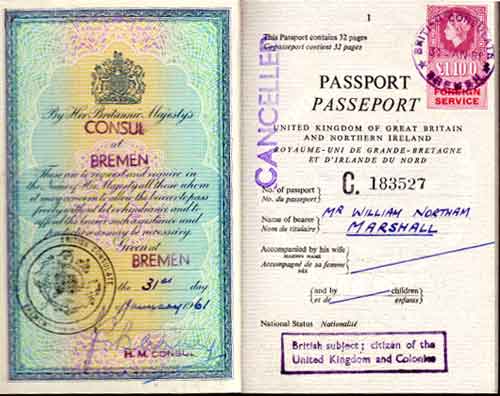
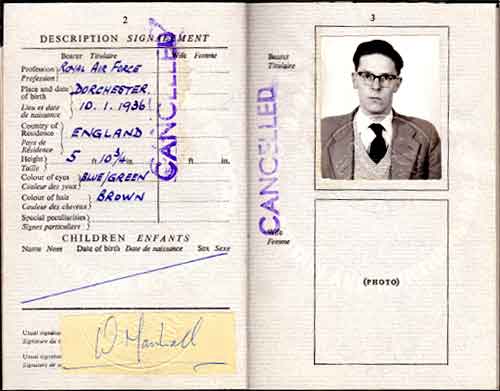
Driving on
RHS
No problem due mainly to so little traffic at that time
Motorways

Actually the German Autobahns - excellent
Central heating

Almost unknown in private houses in the UK at that time
Mountains

Saw real mountains
Celeriac

Thought we had bought some parsnips! - What a surprise
Food

Germany cuisine not renowned apart from wholesome soups. Others included Wiener schnitzel, nasi-goreng, Danish open sandwiches and pastries, black bread, various wines and beers
Education

Took and passed an examination sent out from Southampton University invigilated by a station education officer - many thanks
Language

Learnt some basic German. Thankfully, most Germans we knew wanted to learn English.
Shared living

Got on very well with our German landlady. She took my wife shopping and to meet her friends. She served us tea and made special cakes. Nothing was too much trouble. Actually much better that living on-camp in quarters
Winning Bingo

Won £50 (£1,028 today) the only time I ever played

Overall I enjoyed my stint in the RAF which helped in developing my engineering profession by exposing me to real world experiences in maintaining complex military equipment. I later used such experience in designing and producing specialist hardware and software used by non-technical specialists.
W Marshall
C.Eng.
MIET
Formerly 3154697
Cpl. William (Bill) Marshall
wn.marshall@virgin.net